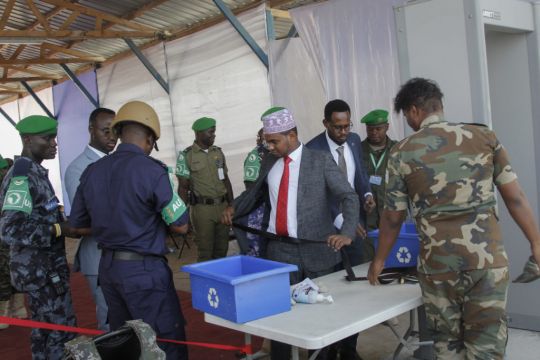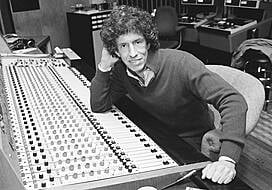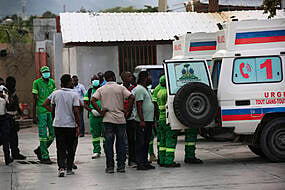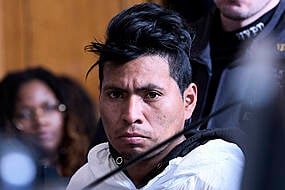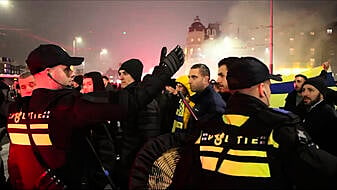Somalia’s presidential vote is proceeding to a second round after the first round of voting did not produce a decisive winner.
Legislators are choosing the country’s next president in the capital, Mogadishu, which is under lockdown measures aimed at preventing deadly militant attacks.
The top four candidates out of 36 presidential aspirants will be on the ballot in the next round: incumbent President Mohamed Abdullahi Mohamed, former President Hassan Sheikh Mohamud, former Prime Minister Hassan Khaire and regional leader Said Dani.
Mr Dani, president of Puntland state, led the first round of balloting.
Voting was taking place inside a tent in an airport hangar within the Halane military camp, which is protected by African Union peacekeepers.
The voting process is expected to last until late on Sunday, especially if a third round of balloting are needed.

To discourage extremist violence from disrupting the elections, Somali police put Mogadishu, the scene of regular attacks by the Islamic rebel group al-Shabab, under a lockdown that started at 9pm on Saturday.
It means most residents must stay at home until the lockdown lifts on Monday morning, according to police.
“Movements are entirely prohibited, including traffic, businesses, schools and even people,” said police spokesman Abdifatah Adan Hassan.
Analysts say the current president Mohamed — who is also known as Farmaajo because of his appetite for Italian cheese — faces an uphill battle to be reelected. No sitting president has ever won reelection in the Horn of Africa nation, where rival clans battle intensely for political power.
The goal of a direct, one-person-one-vote election in Somalia, which has a population of 12 million, remains elusive largely because of the widespread extremist violence.
Authorities had planned a direct election this time but the federal government and states agreed on another “indirect election”, with parliamentarians elected by community leaders — delegates of powerful clans — in each member state.
All 329 members of both chambers of parliament will pick the president by secret ballot.
“We urge the parliamentarians to vote their conscience by choosing the candidate they believe offers the policies and leadership qualities to advance peace, stability, prosperity and sound governance in the years ahead,” the UN Assistance Mission in Somalia and others in the international community said in a statement on Saturday.

Despite its persistent insecurity, Somalia has had peaceful changes of leadership every four years since 2000, and it has the distinction of having Africa’s first democratically elected president to peacefully step down, Aden Abdulle Osman in 1967.
Mohamed’s four-year term expired in February 2021, but he stayed in office after the lower house of parliament approved a two-year extension of his mandate and that of the federal government, drawing fury from Senate leaders and criticism from the international community.
The poll delay triggered an exchange of gunfire in April 2021 between soldiers loyal to the government and others angry over what they saw as the president’s unlawful extension of his mandate.
Somalia began to fall apart in 1991, when warlords ousted dictator Siad Barre and then turned on each other. Years of conflict and al-Shabab attacks, along with famine, have shattered the country which has a long, strategic coastline by the Indian Ocean.
